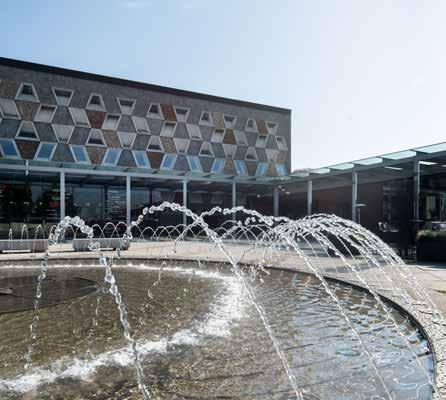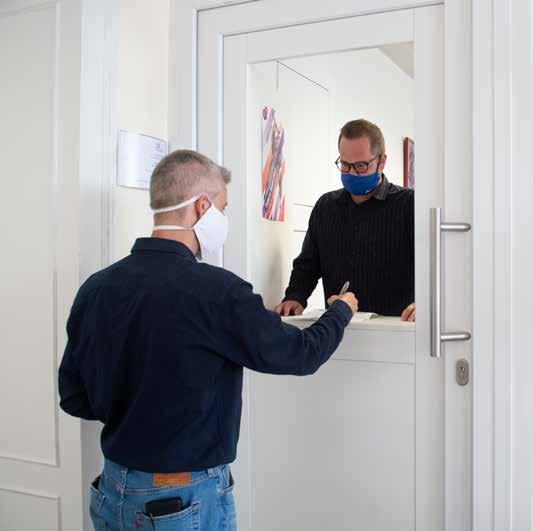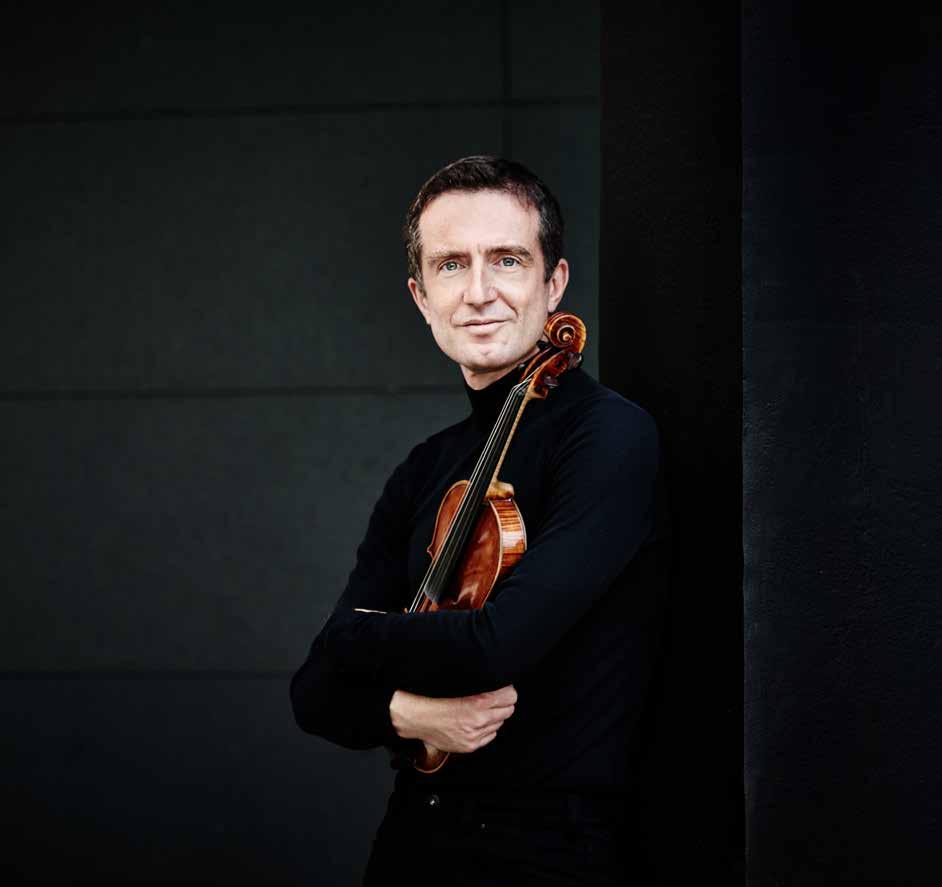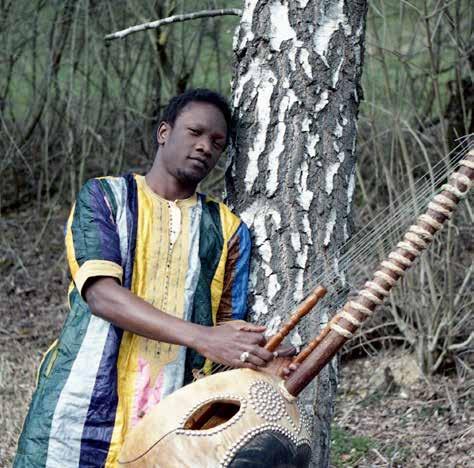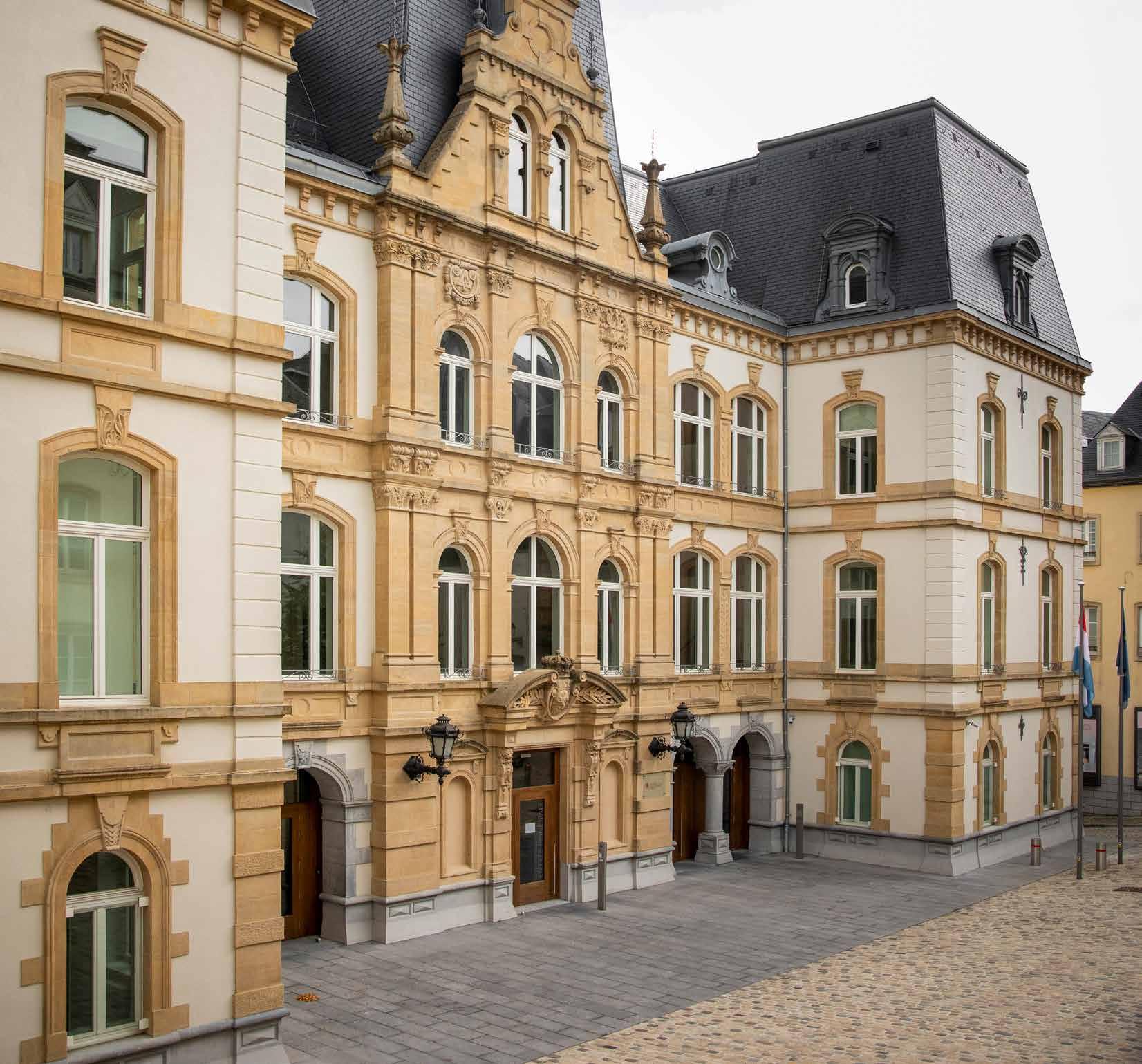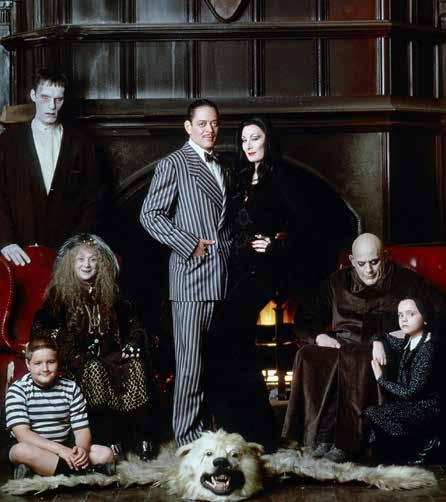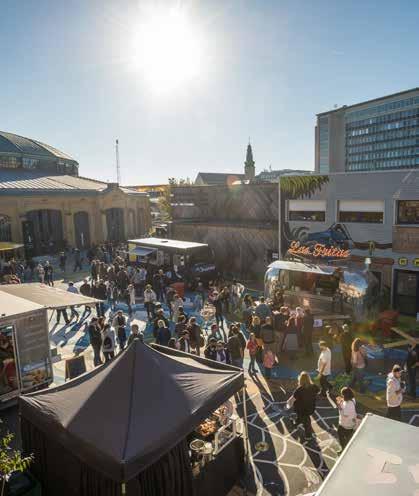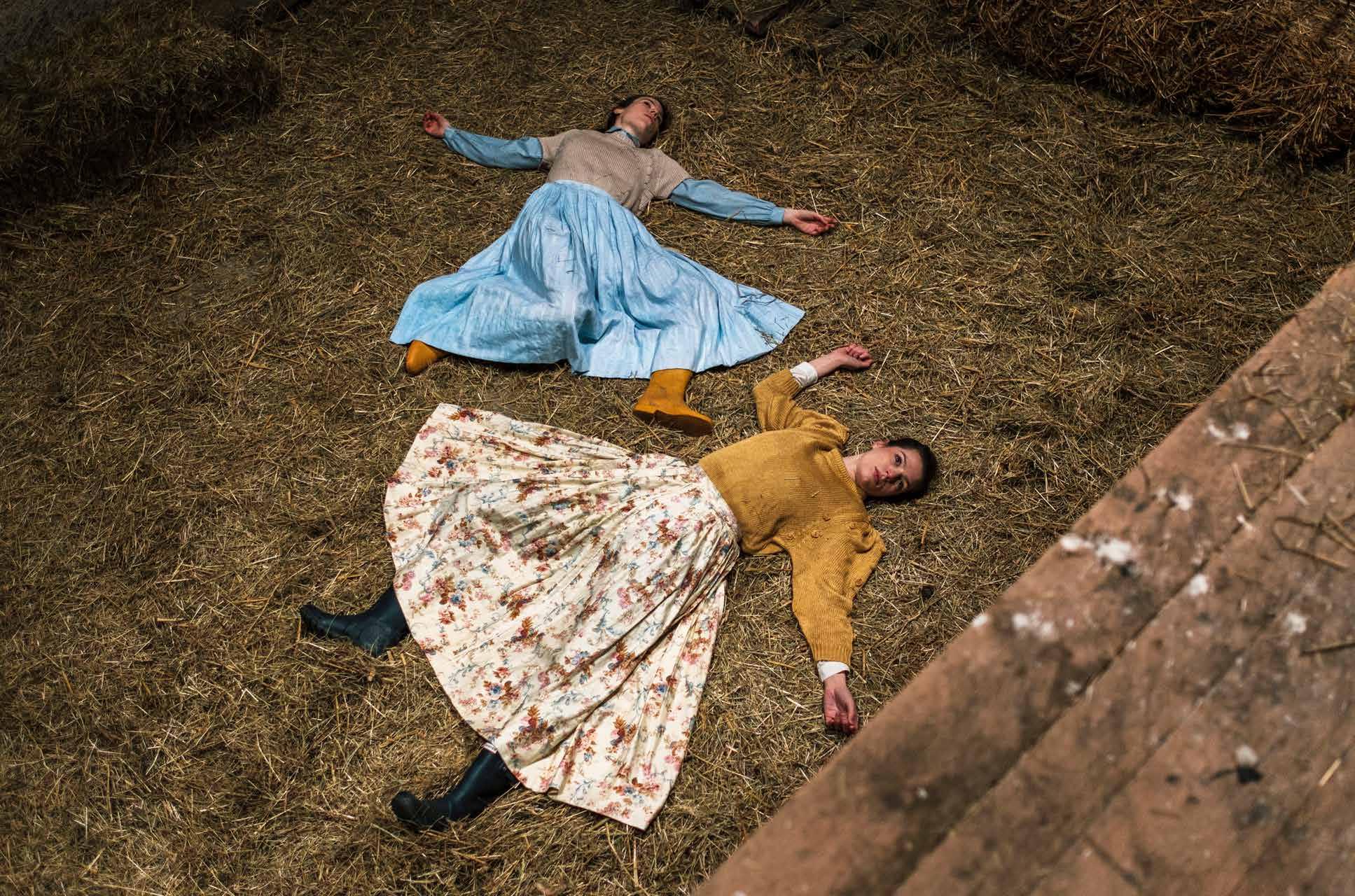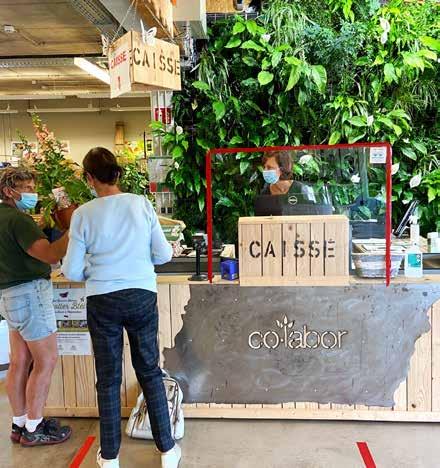
10 minute read
ŒUVRE NATIONALE DE SECOURS GRANDE-DUCHESSE CHARLOTTE
from City Octobre 2020
L’ŒUVRE, POUR UN MONDE MEILLEUR
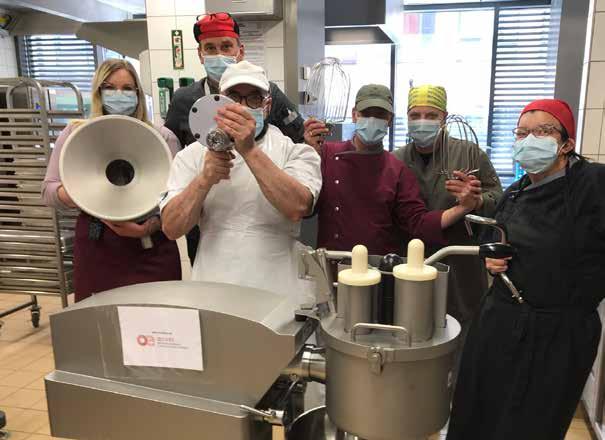
A BETTER WORLD WITH ŒUVRE
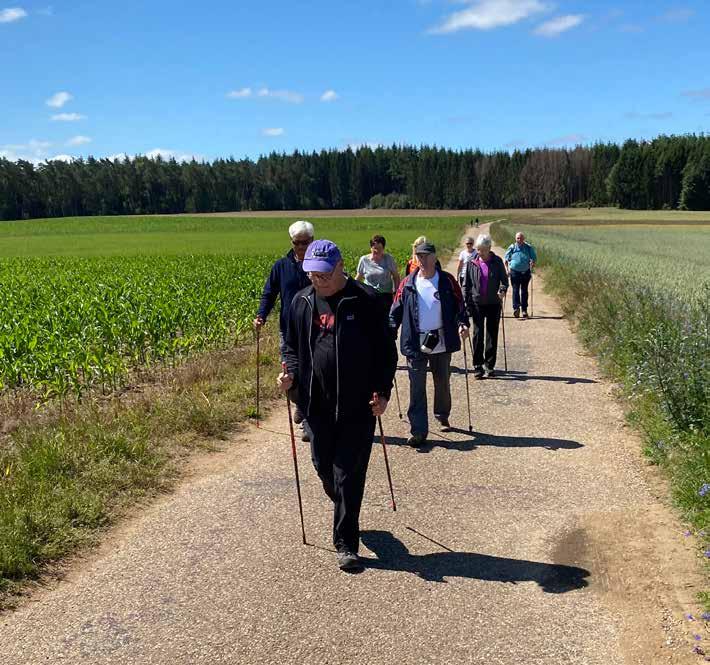
Auteur ANNE FOURNEY Photographes C A R O L I N E M A R T I N ET ŒUVRE
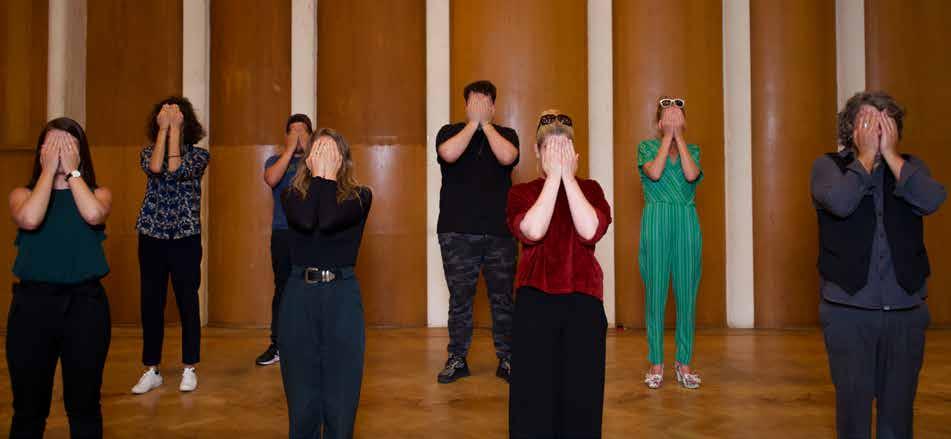

Créée il y a 75 ans pour aider les Luxembourgeois meurtris par la guerre, l’Œuvre Nationale de Secours
Grande-Duchesse Charlotte est aujourd’hui un acteur majeur de soutien aux projets d’intérêt général. Ils s’inscrivent dans cinq domaines : la culture, l’environnement, le social, le sport & santé ainsi que la mémoire. p. 69 Created some 75 years ago to help the people of Luxembourg afflicted by the war, Œuvre Nationale de Secours Grande-Duchesse
Charlotte is nowadays a major player when it comes to supporting general interest projects. These projects cover five areas: culture, environment, social welfare, sport & health and collective memory.
FR
Environ 200 projets sont soumis tous les ans spontanément à l’Œuvre Nationale de Secours Grande-Duchesse Charlotte. Quelque 65% sont finalement subventionnés, après avoir été validés par le conseil d’administration qui se fait conseiller de manière ponctuelle par des jurys composés de personnes externes à l’Œuvre et ayant une expertise dans le domaine représenté.
Plusieurs critères interviennent dans la sélection, le principal étant qu’il existe un lien concret avec le
Luxembourg. Les projets doivent être novateurs, s’inscrire dans la durée et être soit capables de s’autofinancer par la suite, soit repris par une instance étatique. Au-delà de ces aides financières, l’Œuvre a un rôle de coordinateur sur le terrain, où elle met en relation les porteurs de projets avec d’autres organismes. Elle soutient de façon régulière des organisations humanitaires ou sociales (voir encadré), lesquelles doivent justifier ensuite de l’utilisation des sommes reçues chaque année.
L’Œuvre Nationale de Secours
Grande-Duchesse Charlotte travaille en étroite collaboration avec de nombreux partenaires, dont la Ville de Luxembourg, et organise par ailleurs des conférences, formations, journées thématiques.
DES PROJETS VARIÉS Si l’Œuvre Nationale de Secours Grande-Duchesse Charlotte

ÉQUIPE
Claudine Lorang, secrétaire générale adjointe et coordinatrice de projets ; Emile Lutgen, directeur ; Florence Ahlborn, coordinatrice de projets.
TEAM
Claudine Lorang, deputy secretary general and project coordinator; Emile Lutgen, director; Florence Ahlborn, project coordinator.
intervient dans cinq grands domaines, la plupart des projets soutenus ont une répercussion sociale.
«Même si au Luxembourg, on est très bien couvert par l’État, il reste toujours des gens qui ne sont pas dans ce cas et qu’il faut aider», résume le directeur de l’Œuvre, Emile Lutgen.
L’Œuvre intervient donc dans le domaine social au sens large, notamment pour des associations avec un projet d’aide aux sans-abri, d’aide aux toxicomanes ou à des publics fragiles.
Dans le domaine de la culture, le fonds stART-up, créé par l’Œuvre, accompagne depuis 2012 les jeunes artistes et créateurs qui se lancent dans leur vie professionnelle. Il élargit aujourd’hui son soutien aux jeunes qui veulent travailler dans le secteur culturel et qui ont besoin pour cela de se former. Ce fonds a aidé des artistes comme Edsun, vainqueur en 2018 des Luxembourg Music Awards. En 2019, une vingtaine de bénéficiaires a pu profiter de cette subvention qui peut atteindre 25000 euros.
Un autre projet culturel, soutenu par l’Œuvre, a profité d’une belle visibilité sur les réseaux sociaux pendant le confinement du printemps 2020: les « Live aus der Stuff», lancés par l’artiste Serge Tonnar, et devenus par la suite le « Kulturkanal (KuK) », ont permis à un artiste de se produire en direct chaque soir sur Facebook. Cette initiative a permis à de nombreuses personnes de bénéficier de concerts en live et à quelques artistes de toucher un cachet et de s’exprimer face à une audience, pendant une période particulièrement difficile pour eux.
L’un des soutiens les plus visibles de ces dernières années concerne le domaine de l’environnement. En 2014, l’Œuvre a aidé le Mouvement écologique à établir l’Oekozenter, son siège, au Pfaffenthal. L’édifice a été restauré selon des normes de construction durable et de basse consommation d’énergie grâce aux aides conjointes de l’État, de la Ville de Luxembourg et de l’Œuvre Nationale de Secours Grande-Duchesse Charlotte.
DES PROJETS DE TOUTES ENVERGURES Bien d’autres projets environnementaux ont été soutenus depuis, proposés par de nombreuses associations, que ce soit natur&ëmwelt, Fondation Hëllef fir d’Natur ou encore Co-Labor, dont le nouveau siège à Bertrange (Grevelsbarrière) a lui aussi bénéficié d’une aide de l’Œuvre. De nombreux projets, bien plus modestes, de ces associations sont régulièrement subventionnés.
Côté sport, et moins médiatisé, l’Œuvre, en tant que partenaire du programme national thérapeutique Sport-Santé, soutient là aussi de nombreux projets chaque année. Citons par exemple celui qui permet à des personnes convalescentes, en rémission d’un cancer par exemple, de suivre une rééducation sportive encadrée par un coach, à l’abri du regard des autres. Ou encore les sessions de boxe avec l’équipe de la prison de Schrassig pour des personnes atteintes de la maladie de Parkinson. Là encore, la dimension sociale, via l’inclusion, est présente.
AU-DELÀ DES PROJETS, UNE VISION Les projets soutenus par l’Œuvre peuvent englober un ensemble d’initiatives, à l’instar de Mateneen (lire p.86), grand appel à projets lancé en 2015 et qui a rassemblé au total environ 80 initiatives autour de l’accueil, l’intégration et l’éducation des réfugiés au Grand-Duché. Parmi ces initiatives, l’association Digital Inclusion collecte de vieux appareils électroniques pour les remettre en état afin de permettre aux réfugiés et à d’autres personnes dans le besoin de rester connectés. Mateneen est le plus grand appel à projets lancé par l’Œuvre en 75 ans.
Au-delà de l’aide concrète apportée aux réfugiés arrivés au Luxembourg, Mateneen engage une vision de la société de demain, un cheminement commun de plusieurs cultures et de personnes. .
75 ANS
La GrandeDuchesse Charlotte a créé l’Œuvre en 1944.
75 YEARS
Grand Duchess Charlotte created the Œuvre in 1944.
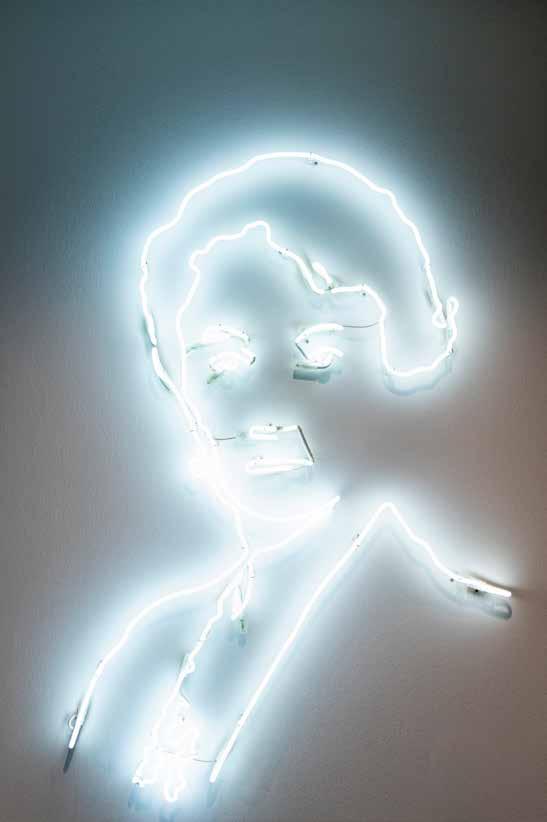
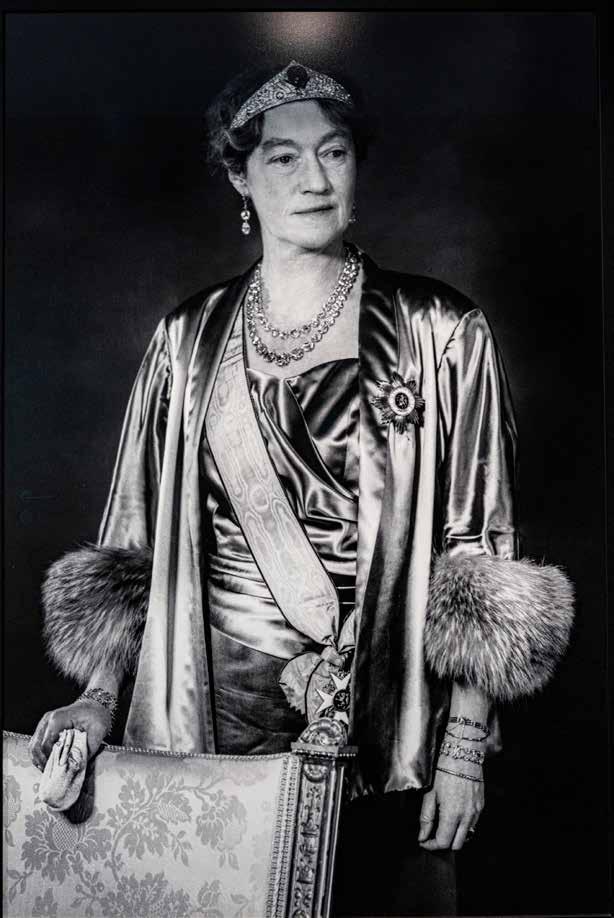
EN
Around 200 projects are spontaneously submitted to Œuvre Nationale de Secours Grande-Duchesse Charlotte each year. Around 65% of these end up being subsidised, following selection by a panel of judges who come from outside the organisation and are experts in their chosen field. Several criteria are considered as part of the selection process, the main one being that there be a concrete link with Luxembourg. Projects must be innovative, sustainable in the long-term and either be subsequently self-financed or taken over by a state body. In addition to the financial aid, Œuvre has a coordinating role in the field by connecting project leaders with other organisations. It provides regular support to some humanitarian or social organisations (see table), which are then required to report on the use of the funds received each year.
The Œuvre Nationale de Secours Grande-Duchesse Charlotte works in close collaboration with numerous partners, including the City of Luxembourg, and also organises conferences, training workshops and theme days.
A VARIETY OF PROJECTS Even though the Œuvre Nationale de Secours Grande-Duchesse Charlotte supports projects in five main areas, most of them have a social impact.
“Even if the State provides very good protection in Luxembourg, there are still people who are left out and need to be helped,” explains the director of the organisation, Émile Lutgen.
Therefore, the organisation works in the area of social welfare in the broadest sense, and assists, amongst others, associations with projects to help the homeless, drug addicts or vulnerable groups.
Regarding the field of culture, the stART-up fund, created by Œuvre, has been supporting young artists and creators starting out their careers since 2012. It is now extending its support to young people wishing to work in the cultural sector and needing training to do so. This fund has helped artists such as Edsun, winner of the 2018 Luxembourg Music Awards. In 2019, about 20 recipients benefitted from this grant, which can reach 25,000 euros.
Another cultural project supported by the Œuvre gained a lot of visibility on social media during the lockdown this spring: the “Live aus der Stuff” which has since become the «Kulturkanal (KuK)». Launched by the artist Serge Tonnar, the project enabled an artist to perform live each evening on Facebook. The initiative gave many people the opportunity to enjoy live concerts, and it was an opportunity for several artists to give a paid performance in front of an audience, during a particularly difficult time for them.
In recent years, one of the most noticeable supports relates to the environment field. In 2014, Œuvre helped the Mouvement Écologique establish its headquarters, the Oekozenter, in Pfaffenthal. The building was restored according to sustainability and low energy consumption standards thanks to the joint support of the State, the City of Luxembourg and the Œuvre Nationale de Secours Grande-Duchesse Charlotte.
PROJECTS OF ALL SCOPES AND SIZES Since then, many more environmental projects have been supported, initiated by numerous organisations, such as natur&ëmwelt Fondation Hëllef fir d’Natur or Co-Labor, whose new headquarters in Bertrange (Grevelsbarrière)
also received funding from the Œuvre. Many of the smaller projects undertaken by these organisations are regularly subsidised.
Being a partner of the national therapeutic programme Sport-Santé, Œuvre also supports many sports projects each year in a field which generally receives less media coverage. For instance, one project allows cancer-recovering patients to follow a sports rehabilitation programme supervised by a coach, in privacy. Another example is the boxing sessions organised with the Schrassig prison team for people suffering from Parkinson’s disease. Once again, the social aspect comes into play through inclusion.
BEYOND PROJECTS, A SHARED VISION The projects backed by Œuvre include a variety of different initiatives. For instance, Mateneen (read p.86) was a major call for projects in 2015 which brought together a total of around 80 initiatives focusing on the arrival, integration and education of refugees in the Grand Duchy. One of these initiatives is the organisation Digital Inclusion, which collects old electronic devices and refurbishes them to enable refugees and people in need to stay connected. Mateneen is the largest call for projects supported by Œuvre over the past 75 years.
In addition to the concrete help provided to refugees arriving in Luxembourg, Mateneen promotes a perspective on tomorrow’s society, involving a shared journey across cultures and people.
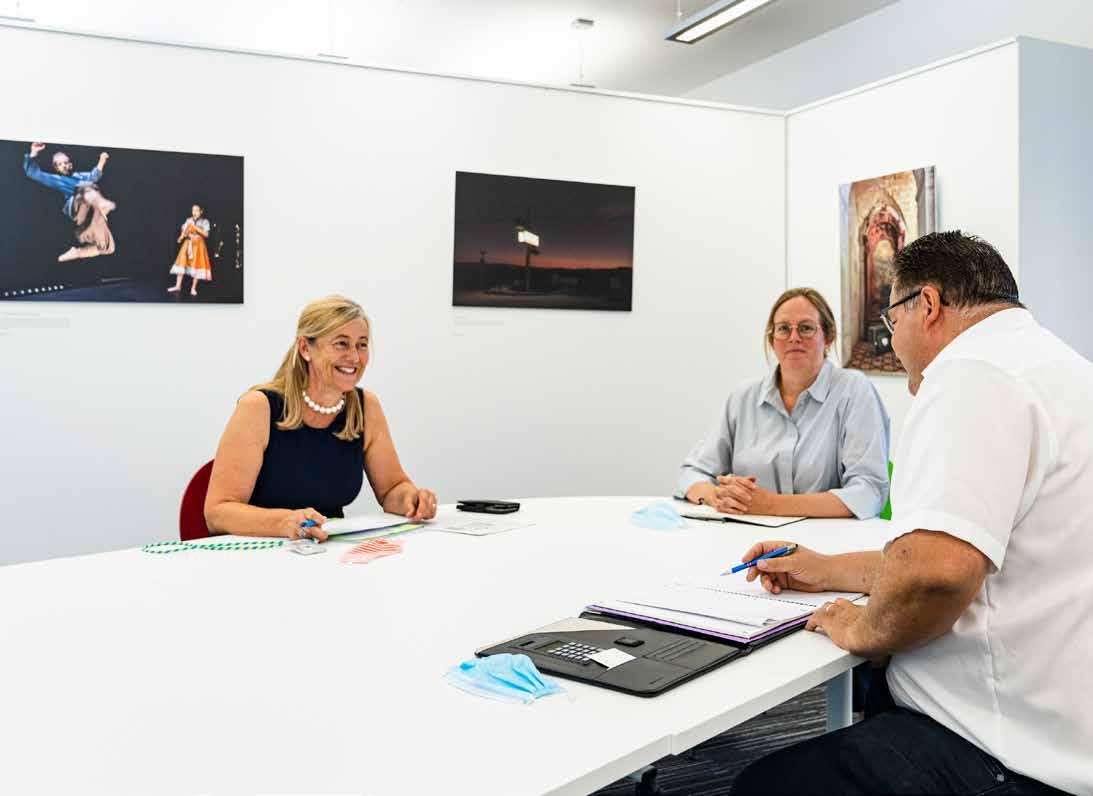
LA GENÈSE DE L’ŒUVRE / THE ORIGINS OF ŒUVRE
F R La Grande-Duchesse Charlotte a lancé l’Œuvre Nationale de Secours Grande-Duchesse Charlotte en 1944, à Noël. La Loterie nationale a vu le jour peu après pour la financer. La vocation de l’Œuvre était de venir en aide aux familles les plus éprouvées par la guerre, un effort qui a perduré jusque dans les années 90. Plusieurs entités sont par la suite devenues des bénéficiaires réguliers comme le Fonds national de solidarité, le Comité olympique et sportif luxembourgeois, le Fonds culturel national (Focuna), Caritas, la Croix-Rouge ou la Ligue et les offices sociaux. Le soutien à des projets d’intérêt commun interviendra plus tard, dans les années 70-80. Depuis 2009, la Loterie Nationale et l’Œuvre constituent une seule entité, la seconde gérant la première. Afin d’assurer une gestion des projets optimale et de travailler avec de nombreux partenaires, l’Œuvre a étoffé son équipe. Elle est aujourd’hui composée de dix salariés, dont quatre coordinateurs de projets et un service communication. Le président est Pierre Bley, depuis 1999.
Ses résultats sont publiés chaque année et peuvent être consultés sur le site œuvre.lu. E N Grand Duchess Charlotte started the Œuvre Nationale de Secours GrandeDuchesse Charlotte in 1944, at Christmas. The National Lottery was created shortly after in order to raise funds for the aid organisation. The aim of Œuvre was to help families most affected by the war, a mission that continued until the 1990s. A number of other organisations subsequently became regular beneficiaries, such as the National Solidarity Fund, the Luxembourg Olympic and Sports Committee, the National Cultural Fund (Focuna), Caritas, the Red Cross or the League and the social welfare offices. Later, in the 1970s and 1980s, support for projects of general interest was provided. Since 2009, the National Lottery and Œuvre have become a single unit, with the latter managing the former. In order to ensure the best possible project management and to work with numerous stakeholders, Œuvre has expanded its team. It now has ten employees, including four project coordinators as well as a communications department. The president has been Pierre Bley since 1999.
The organisation’s results are published each year and can be accessed on the œuvre.lu website.

